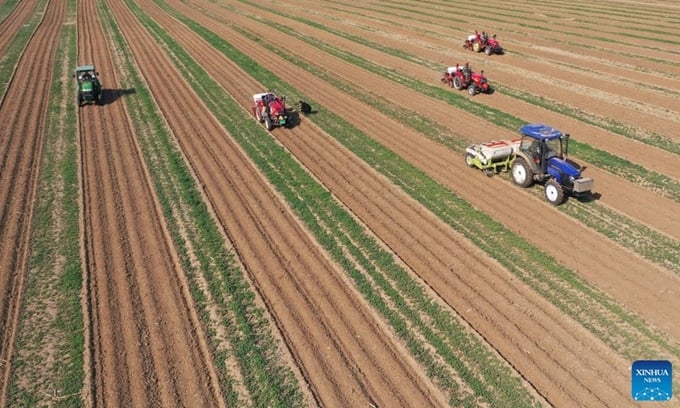November 24, 2025 | 18:48 GMT +7
November 24, 2025 | 18:48 GMT +7
Hotline: 0913.378.918
November 24, 2025 | 18:48 GMT +7
Hotline: 0913.378.918

Aerial photo taken on May 11, 2022 shows farmers operating machines to sow soybean seeds in Fanhe Township of Tieling, northeast China's Liaoning Province. Liaoning has stepped up efforts on farming activities as the temperature rises recently. By May 17, the province's spring sowing area of crops has reached 48,645,000 mu (3,243,000 hectares). Photo: Xinhua
China's Ministry of Agriculture and Rural Affairs on Monday vowed to step up efforts to achieve a bumper grain harvest in 2024 and ensure grain output reach more than 1.3 trillion jin (650 million tons) in a bid to safeguard the country's food security.
More specific measures are to be rolled out to support realization of the so-called "No1 Central Document" for 2024.
The ministry said that it will assign grain, soybean and oil crops to individual provinces, and will stabilize the sowing area of grain crops to above 1.77 billion mu (118 million hectares), according to a statement posted on the ministry's website.
The authorities urged for enhanced efforts to increase the output of soybeans and oil crops, and ensure that the planting area of soybeans be stabilized above 150 million mu and that of oil crops will steadily grow.
The circular also outlined tasks in consolidating and building on the achievements in poverty alleviation and avoiding large-scale return to poverty in rural areas, as well as boosting the development of agricultural technology and equipment.
The issuance of the statement came as China unveiled its "No. 1 central document" for 2024 on February 3, outlining the priorities for comprehensively promoting rural revitalization.
To fully realize rural revitalization, the country should safeguard the bottom line of safeguarding national food security and avoiding a large-scale rural return to poverty, and focus on enhancing rural infrastructure projects and rural governance, the document noted.
In 2023, China's grain output reached a record high of 695.41 million tons, with the sufficient food supply and stockpiles providing strong support for the country's continuous economic recovery, official data showed.
(Global Times)

(VAN) Brazil's COP30 presidency pushed through a compromise climate deal on Saturday that would boost finance for poor nations coping with global warming but that omitted any mention of the fossil fuels driving it.

(VAN) Poultry farmers in the UK have been warned that they could face one of the worst winters yet for bird flu.

(VAN) Prices of main-crop paddy have risen sharply, with jasmine rice hitting 16,100 baht per tonne — the highest level in years.

(VAN) In Brazil, FAO unveiled a series of reports and initiatives showing how sustainable agrifood systems are a solution to the climate crisis.

(VAN) With names like neodymium and dysprosium, rare-earth elements sound exotic — and their perceived scarcity has only added to the mystique.

(VAN) In a new study published in Trends in Biotechnology, researchers used a gene-editing technology called CRISPR to increase a fungus's production efficiency and cut its production-related environmental impact by as much as 61%- all without adding any foreign DNA.

(VAN) A top official in Beijing’s Cop delegation says China is committed to clean energy – but US’s absence is a problem.